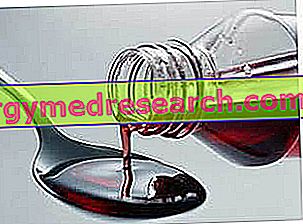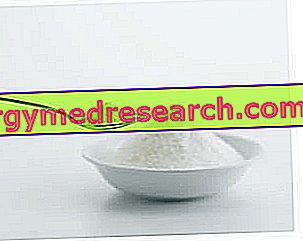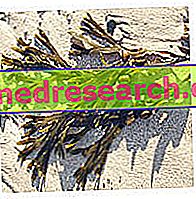Watch the video
X Watch the video on youtubePremise
The cure for dry cough is not always so immediate. We remember, in fact, that it constitutes a symptom common to numerous pathologies;

Contrary to common thought, it is a good rule to avoid self-treatment (also and especially in the initial stage of a pathology) in order to calm the dry cough. In fact, in the absence of an expert's opinion, the do-it-yourself therapy could be dangerous mainly because the drugs or substances used to "calm" the cough could delay or hinder a subsequent diagnosis.
Step back to understand ...
Dry cough is a lighted sign of many affections of a different nature. Fortunately, in most cases, dry cough is a characteristic symptom of infections of the upper respiratory tract, and for this reason is easily solved. In other patients, however, dry cough may hide different diseases, such as asthma, allergic reactions, COPD and lung / laryngeal cancer.
Often, dry cough has a psychogenic origin, that is related to conditions of stress, anxiety and panic.
Medications and treatments
After ascertaining what lies behind the dry cough, the doctor can direct the patient towards the most appropriate treatment to speed up his recovery.
The most used drugs in therapy for dry cough are sedatives, which can therefore exert a powerful calming action on it.
Sedative cough medications are indicated to suppress the symptom without interfering in any way with the cause that caused it. That being said, we understand how it is necessary to treat the underlying disease as well.
So let's see which are the most used drugs to treat the most common types of dry cough:
Type of dry cough | Possible medications and treatments |
Dry cough due to asthma | Dry cough that is characterized by wheezing and whistling is typical of asthmatic patients. It is generally a cough of allergic origin, which requires treatment with anti-asthmatic drugs (eg salbutamol, theophylline and derivatives, cromoglicic acid, etc.) or with glucocorticoids to be taken primarily by inhalation (eg Fluticasone , Beclometasone , Methylprednisolone ). |
Dry cough due to COPD | The most appropriate therapy for restoring COPD-dependent cough is to quit smoking: by slowing the progression of the disease until it is stopped, abstention from smoking reflexively removes the stimulus of the dry cough. To support therapy against COPD, the doctor may prescribe drugs such as bronchodilators (eg Formoterol, Difillin, etc.), antibiotics, cortisonics (sprays) and nasal anticholinergics (eg Ipratropium), useful for cough control. |
Bronchitis-dependent dry cough | The dry cough is a characteristic symptom of the first stages of bronchitis: subsequently, the cough becomes productive (fat cough). Similarly to the previous case, abstention from smoking is an excellent precautionary rule for the prevention of bronchitis. To cure the cause of bronchitis, thus removing the triggering bacterium, the patient will have to follow an antibiotic therapy with drugs such as Amoxicillin, Azithromycin etc. .. To speed up the remission of symptoms (including cough), antitussive, bronchodilator and sometimes, cortisone. |
Dry cough due to viral laryngitis and tracheitis | The cough, which in these cases is dry and barking, can be restored with natural remedies such as fumigations prepared with perfumed waters with a soothing and softening action. When the dry cough persists, it is possible to intervene with antitussive drugs (eg dextromethorphan, codeine, dropropizine and cloperastine). Also the demulcent substances are indicated for the treatment of dry cough depending on tracheitis: the products based on glycerin, acacia syrup, licorice and honey create an effective barrier at the level of the mucous membranes of the upper respiratory tract, placating the inflammation. If necessary, respiratory infections can be treated by concomitant administration of specific antibiotic and antiviral drugs against the responsible pathogen. |
Dry cough due to whooping cough | Undoubtedly a very special variant, the dry cough typical of pertussis is easily recognizable by a noisy inspiration that anticipates a violent and noisy emission of air from the mouth. At the end of the series of 5-6 strokes of dry cough, vomiting follows with the escape of a mucous and stringy sputum. The treatment of choice for pertussis involves the administration of antibiotics against Bordetella Pertussis (eg Erythromycin and Clarithromycin ) . To reduce symptoms, the patient can also take cortisone and cough sedatives such as codeine and dextromethorphan. The vaccine prophylaxis is the number one rule to effectively prevent this disease. |
Dry cough due to infectious pneumonia | The dry cough may be a lit spy of viral pneumonia. In these cases, the administration of antitussives such as dextromethorphan and demulcent substances (honey, acacia extract and licorice) is indicated to alleviate cough symptoms. When necessary, follow a therapeutic procedure based on taking antiviral drugs. |
Dry cough depending on smoking | The only treatment that can combat dry cough depending on smoking is to quit smoking, a difficult task for heavy smokers. During the therapy to abandon the unhealthy habit, it is possible to take drugs for the control of the side symptoms like the dry cough: in this case, the demulcents can soften the upper respiratory tract. To appease the symptoms of cough dependent on smoking, natural remedies are very indicated: for this purpose, the advice is to keep the mucous membranes of the throat softened (irritated by dry cough) by taking warm milk mixed with honey and specific herbal teas for the dry cough. Do not forget, however, that some substances used to quit smoking (such as nicotine inhalers) can produce unpleasant side effects just like the cough itself. |
Tumor-dependent dry cough | The typical dry and irritative cough with which a lung cancer begins (or manifests itself in advanced stages) is due to the obstruction of the airways by the tumor mass. In this case, also the symptom control therapy becomes more complex and articulated. To avoid possible interactions with chemotherapy drugs used in therapy, it is recommended to consult your doctor before taking any medication or natural remedy for dry cough. |
When necessary, to calm the symptoms associated with cough (eg sore throat, fever, chest pain, stomach ache etc.), therapeutic aids can be used: for this purpose, common analgesics (NSAIDs) such as Naproxen, Ibuprofen and Paracetamol are particularly indicated. However, it is recommended to follow the doses indicated by the doctor or pharmacist and not to abuse the medicines.
Natural remedies
As an alternative to synthetic sedatives for the treatment of mild to moderate dry cough, it is possible to use natural remedies. For this purpose, herbal teas or herbal preparations based on plants with calming and emollient properties are particularly indicated.
Among the best known, we recall:
- Altea ( Altea officinalis ): being rich in mucilage, the natural marshmallow syrup softens the mucous membranes of the throat, revealing itself to be a good natural remedy against dry cough
- Mallow ( Malva sylvestris ): its epithelium-protective and anti-inflammatory properties of the mucous membranes, make the plant an excellent remedy for dry cough
- Tiglio ( Tilia cordata ): the infusion prepared with the dried flowers of this plant is indicated to protect the pharyngeal and tracheobronchial mucosa in the context of dry cough
Caution
It is always recommended to pay particular attention to possible interactions with drugs: even natural plants can in fact modulate the absorption of some active ingredients.
To avoid unpleasant side effects, the advice is to always make the pharmacist or doctor aware of the possible administration of drugs for the treatment of a given disease.
To ensure the right degree of humidity in the throat and prevent dehydration from dry cough, it is recommended to drink plenty of fluids. Warm milk with honey is preferred to soften the mucous membranes of the throat.
Homeopathic remedies
Some patients suffering from dry cough benefit from the administration of homeopathic products, such as in particular:
- Lycopodium clavatum: useful for the treatment of chronic cough due to laryngeal stress
- Hepar sulfuris: indicated for the treatment of dry, hoarse, barking cough. Also used to combat dry spasmodic cough due to cold drafts.
- Phosphorus: homeopathic remedy indicated for nervous cough, which tends to worsen in the presence of strong and pungent odors.
- Aconitum napellus: homeopathic remedy indicated for the treatment of dry, barking and hoarse cough.
It is always recommended to strictly follow the indications provided by the homeopath and to absolutely avoid self-therapy.
Prevent dry cough
The main rule to prevent the onset of dry cough is not to smoke and to avoid as far as possible polluted and smoke-filled environments.
Also maintaining the environment in which we live and work at the right humidity (40-60%) proves to be important for the purpose of cough prevention: for this reason, we always recommend using humidifiers, especially during the cold months.
To minimize the risk of infection to the upper respiratory tract it is good to always cover yourself with scarves and heavy clothing during the cold months and avoid frequenting individuals affected by viral or bacterial infections. For the same reason, it is good practice to avoid crowded environments to minimize the risk of contracting respiratory infections. Even washing your hands often is an excellent defense against viral infections.
By putting these simple precautions into practice it is possible to reduce the risk of viral infections of the upper respiratory tract, consequently also the dry cough.



